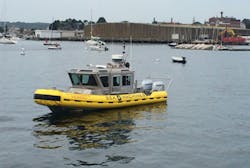Maersk First to Test LiDAR on Container Ship
A.P. Moller-Maersk, of Copenhagen, Denmark has signed with Boston-based Sea Machines Robotics to trial its industry-leading perception and situational awareness technology aboard one of the company’s new-build Winter Palace ice-class container ships.
The deal is significant as the installation marks first time computer vision, Light Detection and Ranging (LiDAR) and perception software will be utilized aboard a container vessel to augment and upgrade transit operations.
The solution, chosen by Maersk, is the latest in Sea Machines’ portfolio and uses artificial intelligence (AI) to improve at-sea situational awareness, object identification and tracking capabilities. Similar to Advanced Driver-Assistance Systems (ADAS) commonly found in automobiles – which alerts drivers of roadway hazards and prevent accidents – Sea Machines’ system uses advanced sensors to collect a continuous stream of information from a vessel’s environmental surroundings, identify and track potential conflicts, and efficiently display the knowledge in the wheelhouse. The system facilitates safer and more efficient maritime operations.
Maersk’s goal of the collaboration is to prove the technology aids the seafarers, can remove the line of sight restriction from the bridge, and provides the infrastructure for a future autonomous collision avoidance system.
“Our team first met Sea Machines around three years ago when they were developing the concepts of their first autonomous systems, and already we were impressed with their technical capability, planned product path, and practical understanding of the future needs of the marine market,” said P. Michael A. Rodey, senior innovation manager, A.P. Moller-Maersk. “For this container ship situational awareness program, we aim to prove the technology increases our safety, efficiency and reliability. Autonomous vessels are not an end goal for Maersk nor is unmanned vessels; what is more of interest is the technology along the journey and the value it brings.”
Sea Machines introduced the world’s first industrial-grade control system to provide autonomous and remote vessel control for workboats and other commercial marine vessels. The SM300 serves operations looking for level 3 operator-in-the loop autonomy in survey, spill response, dredging and security/surveillance. Sea Machines is also actively developing advanced perception technology and navigation assistance technology for a range of vessel types.
